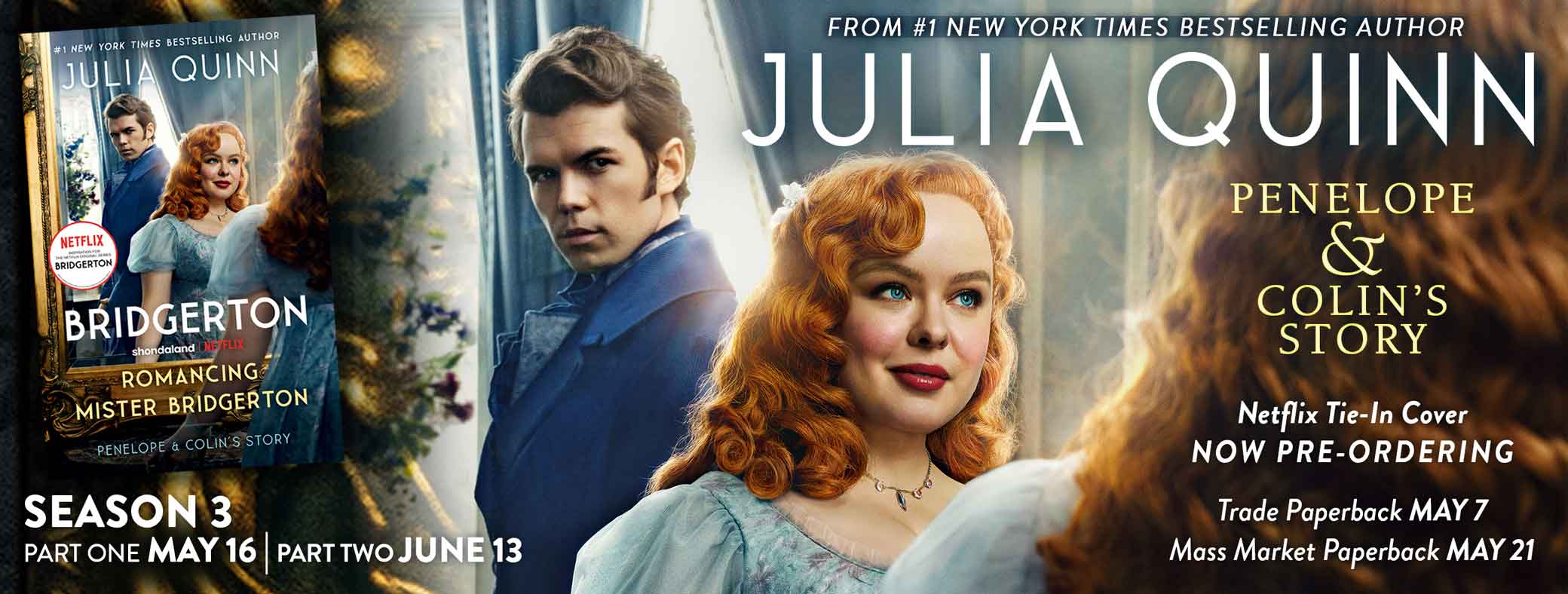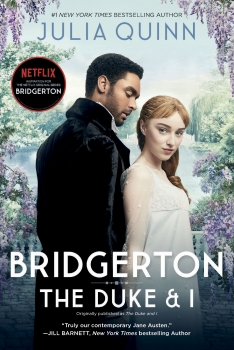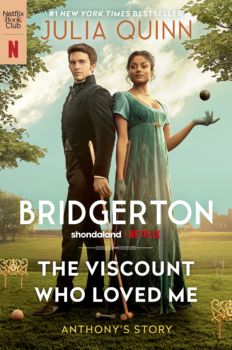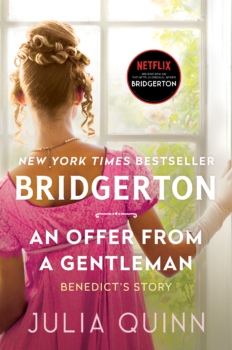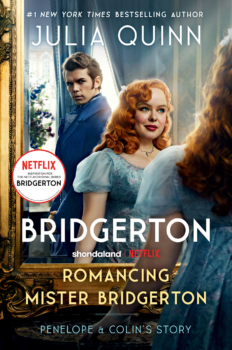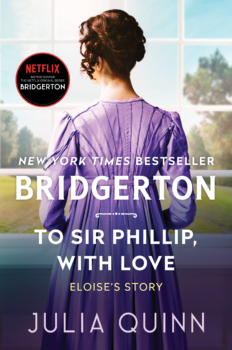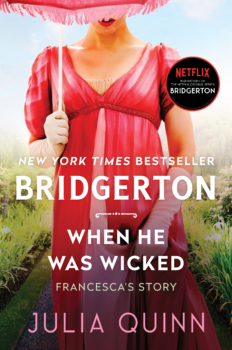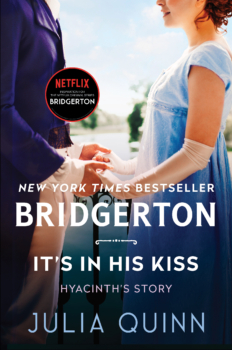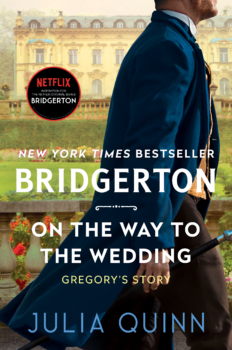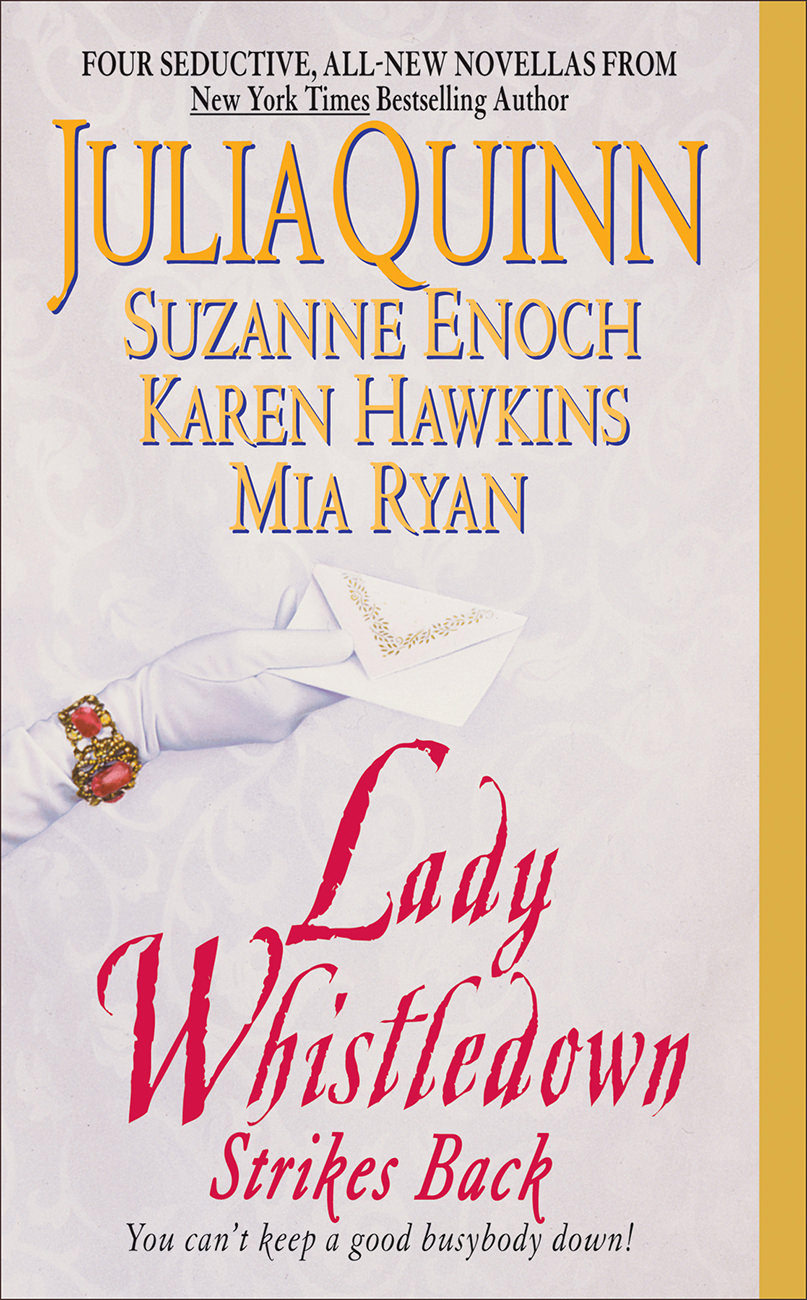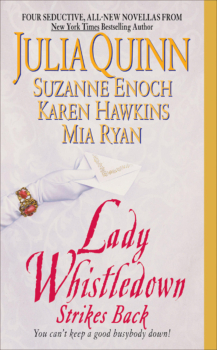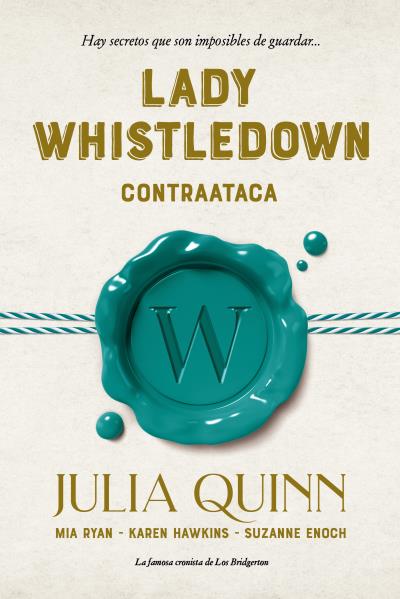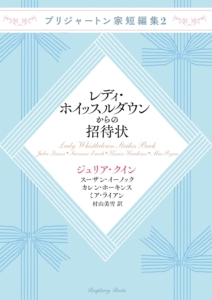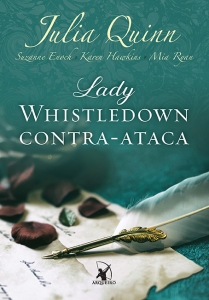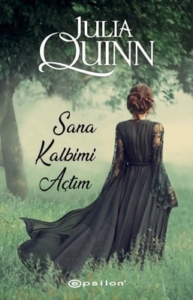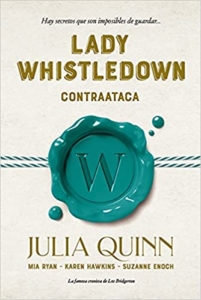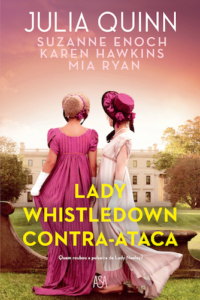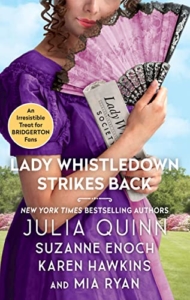Lady Whistledown Strikes Back
“The First Kiss”
Part of the
Bridgerton Series
Who Stole Lady Neeley’s Bracelet?
Was it the fortune hunter, the gambler, the servant, or the rogue? All of London is abuzz with speculation, but it is clear that one of four couples is connected to the crime.
Lady Whistledown’s Society Papers,
May 1816
A dashing fortune hunter is captivated by the Season’s most desired debutante…and must prove he is out to steal the lady’s heart, not her dowry.
Yet another irresistible treat for Bridgerton fans: The Further Observations of Lady Whistledown.
Join the Bridgertons, and the rest of the ton, as they pore over (and gossip about) Lady Whistledown’s latest musings. The elusive Regency-era gossip columnist -- popularized in # 1 New York Times bestselling author Julia Quinn’s Bridgerton novels, now a series created by Shondaland for Netflix – reveals society’s most recent secrets in this second glittering anthology, following the New York Times bestseller, The Further Observations of Lady Whistledown.
 Start Reading Now
Start Reading Now
 Explore Inside this Story
Explore Inside this Story

Books in this series:
Find out more about the Bridgerton Series →
-
Quinn-tessential Quote
"My aim," she said tightly, "is to find a husband. Not to snare one, not to trap one, not to drag one to the altar, but to find one, preferably one with whom I might share a long and contented life."
-
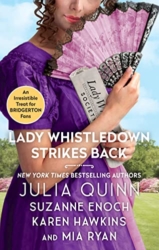
Inside the Story:
JQ’s Author Notes- Make sure you read all four novellas in order! Otherwise you’re going to know “whodunnit” before you’ve read all the clues.
- Did you see Benedict Bridgerton in chapter two? He wasn’t mentioned by name, but fans of An Offer from a Gentleman will recognize him by his description.
- The menu for Lady Neeley’s dinner party comes straight from Mrs. Beeton’s Book of Household Management. My copy dates from the Victorian era, but I figured I could take a little poetic license when it came to food.
- The Lady Whistledown columns narrating all four stories were written by me. It was rather fun to "comment" upon characters written by other authors.
- To learn more about the other stories in the anthology, please visit the websites of the other authors: Suzanne Enoch, Karen Hawkins, and Mia Ryan.
- This is the second Lady Whistledown anthology… A year before this whodunnit, these three authors and I wrote The Further Observations of Lady Whistledown.

Bonus Features
Enjoy an Excerpt
from
Lady Whistledown Strikes Back
Chapter One
This week’s most coveted invitation appears to be Lady Neeley’s upcoming dinner party, to be held Tuesday evening. The guest list is not long, nor is it remarkably exclusive, but tales have spread of last year’s dinner party, or, to be more specific, of the menu, and all London (and most especially those of greater girth) are eager to partake.
This Author was not gifted with an invitation and therefore must suffer at home with a jug of wine, a loaf of bread, and this column, but alas, do not feel pity, Dear Reader. Unlike those attending the upcoming gustatory spectacle, This Author does not have to listen to Lady Neeley!
Lady Whistledown’s Society Papers,
27 May, 1816
Tillie Howard supposed that the night could get worse, but in all truth, she couldn’t imagine how.
She hadn’t wanted to attend Lady Neeley’s dinner party, but her parents had insisted, and so here she was, trying to ignore the fact that her hostess–the occasionally-feared, occasionally-mocked Lady Neeley, had a voice rather like fingernails on slate.
Tillie was also trying to ignore the rumblings of her stomach, which had expected nourishment at least an hour earlier. The invitation had said seven in the evening, and so Tillie and her parents, the Earl and Countess of Canby, had arrived promptly at half past the hour, with the expectation of being led into supper at eight. But here it was, almost nine, with no sign that Lady Neeley intended to forgo talking for eating anytime soon.
But what Tillie was most trying to ignore, what she in fact would have fled the room to avoid, had she been able to figure out a way to do so without causing a scene, was the man standing next to her.
“Jolly fellow, he was,” boomed Robert Dunlop, with that joviality that comes from having consumed just a hair more wine than one ought. “Always ready for a spot of fun.”
Tillie smiled tightly. He was speaking of her brother Harry, who had died nearly one year earlier, on the battlefield at Waterloo. When she and Mr. Dunlop had been introduced, she’d been excited to meet him. She’d loved Harry desperately and missed him with a fierceness that sometimes took her breath away. And she’d thought that it would be wonderful to hear stories of his last days, from one of his comrades in arms.
Except Robert Dunlop was not telling her what she wanted to hear.
“Talked about you all the time,” he continued, even though he’d already said as much ten minutes earlier. ” ‘Cept…”
Tillie did nothing but blink, not wanting to encourage further elucidation. This couldn’t end well.
Mr. Dunlop squinted at her. ” ‘Cept he always described you as all elbows and knees and with crooked braids.”
Tillie gently touched her hand to her expertly-coifed chignon. She couldn’t help it. “When Harry left for the Continent, I did have crooked braids,” she said, deciding that her elbows and knees needed no further discussion.
“He loved you a great deal,” Mr. Dunlop said. His voice was surprisingly soft and thoughtful, enough to command Tillie’s full attention. Maybe she shouldn’t be so quick to judge. Robert Dunlop meant well. He was certainly good at heart, and rather handsome, cutting quite a dashing figure in his military uniform. Harry had always written of him with affection, and even now, Tillie was having trouble thinking of him as anything other than “Robbie.” Maybe there was a little more to him. Maybe it was the wine. Maybe…
“Spoke of you glowingly. Glowingly,” Robbie repeated, presumably for extra emphasis.
Tillie just nodded. She missed Harry, even if she was coming to realize that he had informed approximately one thousand men that she was skinny gawk.
Robbie nodded. “Said you were the best of females, if one could look beneath the freckles.”
Tillie started scouting the exits, searching for an escape. Surely she could fake a torn hem, or a horrible chest cough.
Robbie leaned in to look at her freckles.
Or death. Her thespian demise would surely end up as the lead story in tomorrow’s Whistledown, but Tillie was just about ready to give it a go. It had to be better than this.
“Told us all he despaired of you ever getting married,” Robbie said, nodding in a most friendly manner. “Always reminded us that you had a bang-up dowry.”
That was it. Her brother had been using his time on the battlefield to beg men to marry her, using her dowry (as opposed to her looks, or heaven forbid, her heart) as the primary draw.
It was just like Harry to go and die before she could kill him for this.
“I need to go,” she blurted out.
Robbie looked around. “Where?”
Anywhere.
“Out,” Tillie said, hoping that would be explanation enough.
Robbie’s brow knit in a confused manner as he followed her gaze to the door. “Oh,” he said. “Well, I suppose… There you are!”
Tillie turned around to see who had managed to pull Robbie’s attention off of her. A tall gentleman wearing the same uniform as Robbie was walking toward them. Except unlike Robbie, he looked…
Dangerous.
His hair was dark, honey blond, and his eyes were– well, she couldn’t possibly tell what color they were from three yards away, but it didn’t really matter because the rest of him was enough to make any young lady weak in the legs. His shoulders were broad, his posture was perfect, and his face looked as if it ought to be carved in marble.
“Thompson,” Robbie said again. “Dashed good to see you.”
Thompson, Tillie thought, mentally nodding. It must be Peter Thompson, Harry’s closest friend. Harry had mentioned him in almost every missive, but clearly he’d never actually described him, or Tillie would have been prepared for this Greek god standing before her. Of course, if Harry had described him, he would have just shrugged and said something like, “Regular-looking fellow, I suppose.”
Men never paid attention to details.
“D’you know Lady Mathilda?” Robbie said to Peter.
“Tillie,” he murmured, taking her proffered hand and kissing it. “Forgive me. I shouldn’t be so familiar, but Harry always called you such.”
“It’s all right,” Tillie said, giving her head the tiniest of shakes. “It’s been rather difficult not to call Mr. Dunlop Robbie.”
“Oh, you should,” Robbie said affably. “Everybody does.”
“Harry wrote of us, then?” Peter inquired.
“All the time.”
“He was very fond of you,” Peter said. “He spoke of you often.”
Tillie winced. “Yes, so Robbie has been telling me.”
“Didn’t want her to think Harry hadn’t been thinking of her,” Robbie explained. “Oh, look, there’s my mother.”
Both Tillie and Peter looked at him in surprise at the sudden change of subject.
“I’d better hide,” he mumbled, and then took up residence behind a potted plant.
“She’ll find him,” Peter said, a wry smile glancing across his lips.
“Mothers always do,” Tillie agreed.
Silence fell across the conversation, and Tillie almost wished that Robbie would come back and fill the gap with his friendly, if slightly inane, chatter. She didn’t know what to say with Peter Thomspon, what to do in his presence. And she couldn’t stop wondering –a pox on her brother’s surely laughing soul– if he was thinking of her dowry, and the size thereof, and of the many times Harry had trotted it out as her most shining attribute.
But then he said something completely unexpected.
“I recognized you the moment I walked in.”
Tillie blinked in surprise. “You did?”
His eyes, which she now realized were a mesmerizing shade of gray-blue, watched her with an intensity that made her want to squirm. “Harry described you well.”
“No crooked braids,” she said, unable to keep the tinge of sarcasm out of her voice.
Peter chuckled at that. “Robbie’s been telling tales, I see.”
“Quite a few, actually.”
“Don’t pay him any mind. We all talked about our sisters, and I’m quite certain we all described you as you were when you were twelve.”
Tillie decided then and there that there was no reason to inform him that Harry’s description had fit her to a much later age. While all her friends had been growing and changing, and requiring new, more womanly clothing, Tillie’s shape had remained determinedly childish until her sixteenth year. Even now, she was boyishly slender, but she did have a few curves, and Tillie was thrilled with each and every one of them.
She was nineteen now, almost twenty, and by God she was no longer “all elbows and knees.” And never would be again.
“How did you recognize me?” Tillie ask.
Peter smiled. “Can’t you guess?”
The hair. The wretched Howard hair. It didn’t matter if her crooked braids had made way for a sleek chignon. She and Harry and their elder brother William all possessed the infamous red Howard hair. It wasn’t strawberry blond, and it wasn’t titian. It was red, or orange, really, a bright copper that Tillie was quite sure had caused more than one person to squint and look away in the sunlight. Somehow their father had escaped the curse, but it had returned with a vengeance on his children.
“It’s more that that,” Peter said, not even needing her to say the words to know what she was thinking. “You look a great deal like him. Your mouth, I think. The shape of your face.”
And he said it with such quiet intensity, with such a controlled swell of emotion that Tillie knew that he had loved Harry, too, that he missed him almost as much as she did. And it made her want to cry.
“I–” But she couldn’t get it out. Her voice broke, and to her horror, she felt herself sniffle and gasp. It wasn’t ladylike, and it wasn’t delicate; it was a desperate attempt to keep from sobbing in public.
Peter saw it, too. He took her elbow and expertly maneuvered her so that her back was to the crowd, and then he pulled out his handkerchief and handed it to her.
“Thank you,” she said, dabbing at her eyes. “I’m sorry. I don’t know what came over me.”
Grief, he thought, but he didn’t say it. No need to state the obvious. They both missed Harry. Everyone did.
“What brings you to Lady Neeley’s?” he asked, deciding that a change of subject was in order.
She flashed him a grateful look. “My parents insisted upon it. My father says her chef is the best in London, and he wouldn’t allow us to decline. And you?”
“My father knows her,” he said. “I suppose she took pity on me, so newly returned to town.”
There were a lot of soldiers receiving the same sort of pity, Peter thought wryly. A lot of young men, done with the army, or about to be, at loose ends, wondering what it was they were supposed to do now that they weren’t holding rifles and galloping into battle.
Some of his friends had decided to remain in the army. It was a respectable occupation for a man such as him, the younger son of a minor aristocrat. But Peter had had enough of military life, enough of the killing, enough death. His parents were encouraging him to enter the clergy, which was, in truth, the only other acceptable avenue for a gentleman of little means. His brother would inherit the small manor that went with the barony; there was nothing left over for Peter.
But the clergy seemed somehow wrong. Some of his friends had emerged from the battlefield with renewed faith; for Peter it had been the opposite, and he felt supremely unqualified to lead any flock upon the path of righteousness.
What he really wanted, when he allowed himself to dream of it, was to live quietly in the country. A gentleman farmer. It sounded so… peaceful. So completely unlike everything his life had represented during the past few years.
But such a life required land, and land required money, which was something Peter had in short supply. He’d have a small sum once he sold his commission and officially retired from the army, but it wouldn’t be enough.
Which explained his recent arrival in London. He needed a wife. One with a dowry. Nothing extravagant–no heiress would be allowed to marry the likes of him, anyway. No, he just needed a girl with a modest sum of money. Or better yet, a tract of land. He’d be willing to settle almost anywhere in England as long as it meant independence and peace.
It didn’t seem an unattainable goal. There were plenty of men who’d be happy to marry their daughters to the son of a baron, and a decorated soldier to boot. The fathers of the real heiresses, of the girls with Lady or the Honorable in front of their name would hold out for something better, but for the rest, he’d be considered quite a decent catch indeed.
He looked over at Tillie Howard — Lady Mathilda, he reminded himself. She was exactly the sort he wouldn’t be marrying. Wealthy beyond imagination, the only daughter of an earl. He probably shouldn’t even be talking to her. People would call him a fortune hunter, and even though that’s exactly what he was, he didn’t want the label.
But she was Harry’s sister, and he’d made a promise to Harry. And besides, standing there with Tillie… it was strange. It should have made him miss Harry more, since she looked so damned like him, right down to the leafy green eyes and the funny little angle at which they held their heads when they were listening.
But instead, he just felt good. Relaxed, even, as if this was where he ought to be, if not with Harry, then with this girl.
He smiled at her, and she smiled back, and something tightened within him, something odd and good and…
“Here he is!” shrilled Lady Neeley.
Peter turned around to see what had precipitated their hostess’s louder than normal screech. Tillie stepped to the right –he had been blocking her view– and then let out a little gasp of, “Oh.”
A large, green parrot sat perched on Lady Neeley’s shoulder, and it was squawking, “Martin! Martin!”
“Who’s Martin?” Peter asked Tillie.
“Miss Martin,” she corrected. “Her companion.”
“Martin! Martin!”
“I’d hide, were I her,” Peter murmured.
“I don’t think she can,” Tillie said. “Lord Easterly was added to the guest list at the last minute, and Lady Neeley pressed Miss Martin into service to even up the numbers.” She looked up at him, a mischievous smile crossing her lips. “Unless you decide to flee before dinner, poor Miss Martin is stuck here for the duration.”
Peter winced as he watched the parrot launch itself off of Lady Neeley’s shoulder and flutter across the room to a thin, dark-haired woman who clearly wanted to be anywhere but where she was. She batted at the bird, but the creature would not leave her alone.
“Poor thing,” Tillie said. “I hope it doesn’t peck her.”
“No,” Peter said, watching the scene with amazement. “I think it fancies itself in love.”
And sure enough, the parrot was nuzzling the poor woman, cooing, “Martin, Martin,” as if it had just entered the gates of heaven.
“My lady,” Miss Martin pleaded, rubbing her increasingly bloodshot eyes.
But Lady Neeley just laughed. “A hundred pounds I paid for that bird, and all he does is make love to Miss Martin.”
Peter looked at Tillie, whose mouth was clamped into an angry line. “This is terrible,” she said. “That bird is making the poor woman sick, and Lady Neeley doesn’t give a fig about it.”
Peter took this to mean that he was supposed to play the knight in shining armor and save Lady Neeley’s poor, beleaguered companion, but before he could take a step, Tillie had moved across the room. He followed with interest, watching as she held a finger out and encouraged the bird to leave Miss Martin’s shoulder.
“Thank you,” Miss Martin said. “I don’t know why he’s acting this way. He’s never paid me any mind before.”
“Lady Neeley should put him away,” Tillie said sternly.
Miss Martin said nothing. They all knew that that would never happen.
Tillie took the bird back to its owner. “Good evening, Lady Neeley,” she said. “Have you a perch for your bird? Or perhaps we should put him back in his cage.”
“Isn’t he sweet?” Lady Neeley said.
Tillie just smiled. Peter bit his lip to keep from chuckling.
“His perch is over there,” Lady Neeley said, motioning with her head to a spot in the corner. “The footmen filled his dish with seed; he won’t go anywhere.”
Tillie nodded and brought the parrot over to his perch. Sure enough, it began to peck furiously at its food.
“You must have birds,” Peter said.
Tillie shook her head. “No, but I’ve seen others handle them.”
“Lady Mathilda!” called Lady Neeley.
“You’ve been summoned, I’m afraid,” Peter murmured.
Tillie shot him a supremely irritated look. “Yes, well, you seem to have fallen into the position of my escort, so you will have to come along as well. Yes, Lady Neeley?” she finished, her tone instantly transformed into pure sweetness and light.
“Come over here, gel, I want to show you something.”
Peter followed Tillie back across the room, maintaining a safe distance when his hostess stuck out her arm.
“D’you like it?” she asked, jingling her bracelet. “It’s new.”
“It’s lovely,” Tillie said. “Rubies?”
“Of course. It’s red. What else would it be?”
“Er…”
Peter smiled as he watched Tillie try to deduce whether the question was rhetorical. With Lady Neeley, one never could be sure.
“I’ve a matching necklace as well,” Lady Neeley continued blithely, “but I didn’t want to overdo it.” She leaned forward and said in a tone that on anyone else would not have been described as quiet, “Not everyone here is as plump in the pocket as we two.”
Peter could have sworn she looked at him, but he decided to overlook the affront. One really couldn’t take offense at any of Lady Neeley’s comments; to do so would be to ascribe too much importance to her opinion, and besides, one would forever be running around feeling insulted.
“Wore my earbobs, though!”
Tillie leaned in and dutifully admired her hostess’s earrings, but then, just as she was straightening her shoulders, Lady Neeley’s bracelet, about which she had made such a fuss, slid right off her wrist and landed on the carpet with a delicate thud.
While Lady Neeley shrieked with dismay, Tillie bent down and retrieved the jewels. “It’s a lovely piece,” Tillie said, admiring the emeralds before handing them back to their owner.
“I can’t believe that happened,” Lady Neeley said. “Perhaps it is too big. My wrists are very delicate, you know.”
Peter coughed into his hand.
“May I examine it?” Tillie said, kicking him in the ankle.
“Of course,” the older woman said, handing it back to her. “My eyes aren’t what they used to be.”
A small crowd had gathered, and everyone waited as Tillie squinted and fiddled with the shiny gold mechanism of the clasp.
“I think you will need to have it repaired,” Tillie finally said, returning the bracelet to Lady Neeley. “The clasp is faulty. It will surely fall off again.”
“Nonsense,” Lady Neeley said, thrusting her arm out. “Miss Martin!” she bellowed.
Miss Martin rushed to her side and reaffixed the bracelet.
Lady Neeley let out a “hmmph” and brought her wrist up by her face, examining the bracelet one more time before lowering her arm. “I bought this at Asprey’s and I assure you there is no finer jeweler in London. They would not sell me a bracelet with a faulty clasp.”
“I’m sure they didn’t mean to,” Tillie said, “but–”
She didn’t need to finish. Everyone stared down at the spot on the carpet where the bracelet landed for the second time.
“Definitely the clasp,” murmured Peter.
“This is an outrage,” Lady Neeley announced.
Peter rather agreed, especially since they’d now wasted precious minutes on her shiny bracelet when all anyone wanted at this point was to go into dinner and eat. So many bellies were rumbling he couldn’t tell whose was whose.
“What am I to do with this now?” Lady Neeley said, after Miss Martin had retrieved the bracelet from the carpet and handed it back to her.
A tall, dark-haired man who Peter did not recognize produced a small candy dish. “Perhaps this will suffice,” he said, holding it out.
“Easterly,” Lady Neeley muttered, rather grudgingly, actually, as if she didn’t particularly care to acknowledge the gentleman’s aid. She set the bracelet in the dish, then placed it on a nearby credenza. “There,” she said, arranging the bracelet in a neat circle. “I suppose everyone can still admire it there.”
“Perhaps it could serve as a centerpiece on the table while we dine,” Peter suggested.
“Hmm, yes, excellent idea, Mr. Thompson. It’s nearly time to go in for supper, anyway.”
Peter could have sworn he heard someone whisper, “Nearly?”
“Oh, very, well, we’ll eat now,” Lady Neeley said. “Miss Martin!”
Miss Martin, who had somehow managed to put several yards between herself and her employer, returned.
“See to it that everything is ready for supper,” Lady Neeley said.
Miss Martin exited, and then, amid multiple sighs of relief, the party moved from the drawing room to the dining room.
To his delight, Peter found that he was seated next to Tillie. Normally he wouldn’t find himself next to an earl’s daughter, and in truth, he suspected that he was meant to be paired with the woman on his right, but she had Robbie Dunlop on the other side, and he seemed to be keeping her in conversation quite nicely.
The food was, as gossip had promised, exquisite, and Peter was quite happily spooning lobster bisque into his mouth when he heard a movement to his left, and when he turned, Tillie was looking at him, her lips parted as if she were about to say his name.
She was lovely, he realized. Lovely in a way that Harry could never have described, in a way that he, as her brother, could never even have seen. Harry would never have been able to see the woman beyond the girl, would never have realized that the curve of her cheek begged a caress, or that when she opened her mouth to speak, she sometimes paused first, her lips pursing together slightly, as if awaiting a kiss.
Harry would never have seen any of that, but Peter did, and it shook him to the core.
“Did you want to ask me something?” he asked, surprised that his voice came out sounding quite ordinary.
“I did,” she said, “although I’m not sure how… I don’t know…”
He waited for her to collect her thoughts.
After a moment, she leaned forward, glanced about the table to ascertain if anyone was looking at them, and asked, “Were you there?”
“Where?” he asked, even though he knew exactly what she meant.
“When he died,” she said quietly. “Were you there?”
He nodded. It wasn’t a memory he cared to revisit, but he owed her that much honesty.
Her lower lip trembled, and she whispered, “Did he suffer?”
For a moment Peter didn’t know what to say. Harry had suffered. He’d spent three days in what had to be tremendous pain, both his legs broken, the right one so badly that the bone had burst through the skin. He might’ve survived that, maybe even without too much of a limp –their surgeon was quite adept at setting bones– but then the fever had set in, and it hadn’t been long before Peter realized that Harry would not win his battle. Two days later he was dead.
But when he slipped from life, he’d been listless that Peter wasn’t certain whether he’d felt pain or not, especially with the laudanum he’d stolen from his commander and poured down Harry’s throat. And so, when he finally answered Tillie’s question, he just said, “Some. It wasn’t painless, but I think… at the end… it was peaceful.”
She nodded. “Thank you. I’ve always wondered. I would have always wondered. I’m glad to know.”
He turned his attention back to his soup, hoping that a bit of lobster and flour and broth could banish the memory of Harry’s death, but then Tillie said, “It’s supposed to be easier because he’s a hero, but I don’t think so.”
He looked back at her, his question in his eyes.
“Everyone keeps saying we must be so proud of him,” she explained, “because he’s a hero, because he died on a battlefield at Waterloo, his bayonet in the body of a French soldier, but I don’t think it makes it any easier.” Her lips quivered tremulously, the kind of strange, helpless smile one makes when one realizes that some questions have no answers. “We still miss him just as much as we would have done, had he fallen off his horse, or caught the measles, or choked on a chicken bone.”
Peter felt his lips part as he digested her words. “Harry was a hero,” he heard himself say, and it was the truth. Harry had proven himself a hero a dozen times over, fighting valiantly, and more than once saving the life of another. But Harry hadn’t died a hero, not in the way most people liked to think of it. Harry was already dead by the time they fought the French at Waterloo, his body hopelessly mangled in a stupid accident, trapped for six hours beneath a supply wagon that someone had tried to repair one time too many. The damn thing should have been chopped for firewood weeks earlier, Peter thought savagely, but the army never had enough of anything, including humble supply wagons, and his regiment commander had refused to give it up for dead.
But clearly, this wasn’t the story Tillie had been told, and probably her parents as well. Someone had tried to soften the blow of Harry’s death by painting his last minutes with the deep red colors of the battlefield, in all its horrible glory.
“Harry was a hero,” Peter said again, because it was true, and he’d long since learned that those who hadn’t experienced war could never understand the truth of it. And if it brought comfort to think that any death could be more noble than another, he wasn’t about to pierce the illusion.
“You were a good friend to him,” Tillie said. “I’m glad he had you.”
“I made a promise to him,” he blurted out. He hadn’t meant to tell her, but somehow he couldn’t help himself. “We both made a promise, actually. It was a few months before he died, and we’d both… Well, the night before had been grisly, and we’d lost many of our regiment.”
She leaned forward, her eyes wide and glowing with compassion, and when he looked at her, saw the rose milkiness of her skin, the light dusting of freckles across her nose– more than anything, he wanted to kiss her.
Good God. Right there at Lady Neeley’s dinner party, he wanted to grab Tillie Howard by the shoulders and haul her against him and kiss her for everything he was worth.
Harry would have called him out on the spot.
“What happened?” she asked, and the words should have jolted him back to reality, reminded him that he was telling her something rather important, but all he could do was stare at her lips, which weren’t quite pink, but rather a little peachy, and it occurred to him that he’d never, ever bothered to look at a woman’s mouth before –at least not like this– before kissing her.
“Mr. Thompson?” she asked. “Peter?”
“Sorry,” he said, his fingers fisting beneath the table, as if the pain of his nails against his palms could somehow force him back to the matter at hand. “I made Harry a promise,” he continued. “We were talking about home, as we often did when it was particularly difficult, and he mentioned you, and I mentioned my sister–she’s fourteen–and we promised each other that if anything should befall us, we would watch out for the other’s sister. Keep you safe.”
For a moment she did nothing but look at him, and then she said, “That’s very kind of you, but don’t worry, I absolve you of the vow. I’m no green girl, and I still have a brother in William. Besides, I don’t need a replacement for Harry.”
Peter opened his mouth to speak, then quickly thought the better of it. He wasn’t feeling at all brotherly toward Tillie, and he was quite certain this wasn’t what Harry had in mind when he’d asked him to look out for her.
And the lastthing he wanted to be was her replacement brother.
But the moment seemed to call for a reply, and indeed Tillie was regarding him quizzically, her head tilted to the side as if she were waiting for him to say something quite meaningful and intelligent or if not that, something that would allow her to offer a teasing retort.
Which was why, when Lady Neeley’s awful voice screeched across the room, Peter didn’t mind the sound of it, even it was to say:
“It’s gone! My bracelet is gone!”
Lady Whistledown Strikes Back
by Julia Quinn, Suzanne Enoch, Karen Hawkins, and Mia Ryan.
is available in the following formats:
Mass Market Paperback:
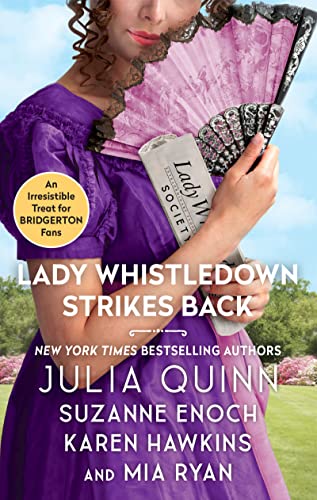
Not ready to order yours? Check out this story's overview. Read the excerpt. Find out more about the series. There’s so much to love!
Awards & Achievements
-
 Julia Quinn was a double finalist in the Best Romantic Novella Category of the 2005 RITA Awards. “The First Kiss” was up against “A Tale of Two Sisters” (from Where’s My Hero?). Alas, neither won. The eventual winner was “Her Enemy” in Night’s Edge by Maggie Shayne. The RITAs are awarded by Romance Writers of America and are the highest honor in romance writing.
Julia Quinn was a double finalist in the Best Romantic Novella Category of the 2005 RITA Awards. “The First Kiss” was up against “A Tale of Two Sisters” (from Where’s My Hero?). Alas, neither won. The eventual winner was “Her Enemy” in Night’s Edge by Maggie Shayne. The RITAs are awarded by Romance Writers of America and are the highest honor in romance writing. -
 Lady Whistledown Strikes Back spent four weeks on each of the USA Today and the New York Times Extended bestseller lists.
Lady Whistledown Strikes Back spent four weeks on each of the USA Today and the New York Times Extended bestseller lists.
